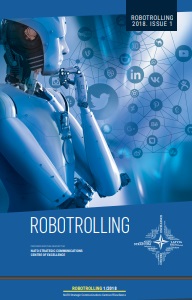ROBOTROLLING 2018/1
ROBOTROLLING 2018/1
Author(s): Author Not Specified
Subject(s): Politics, Media studies, Communication studies, International relations/trade, Security and defense, Social psychology and group interaction, Evaluation research, ICT Information and Communications Technologies, Peace and Conflict Studies
Published by: NATO Strategic Communications Centre of Excellence
Keywords: media; communication; social media; malicious activity; NATO; Baltic countries; Poland; Russia; Russian language; bot; ICT; twitter;
Summary/Abstract: Generational change in malicious activity on social media seems to be at hand. Primitive bots indiscriminately promoting links to news sites are on the decline. They are being replaced by coordinated accounts that target conversations centred upon individual media outlets or members of different elites. In recent months on Twitter, the volume of automated content about NATO activity in the Baltics and Poland has declined at an increasingly rapid pace. The number of bottweets dropped by 15 percentage points for Russian and 20 percentage points for English. We infer that this reduction is best explained by changes introduced by the platform. Our findings are verified by drawing on thirty times more data than for previous Robotrolling issues. For the first time we include messages from VKontakte as a control. We see a marked rise in organised trolling activity conducted by humans using fake accounts compared to early 2017. As of January 2018, 50% of all Russian-language messages are directed at other Twitter users. As social media companies intervene to clean up automation, they should take care that changes they introduce may enable new forms of manipulation. Russian language bot activity is in decline in absolute terms, but Twitter in Russian remains more polluted than Twitter in English.
- Page Count: 6
- Publication Year: 2018
- Language: English
- Content File-PDF

